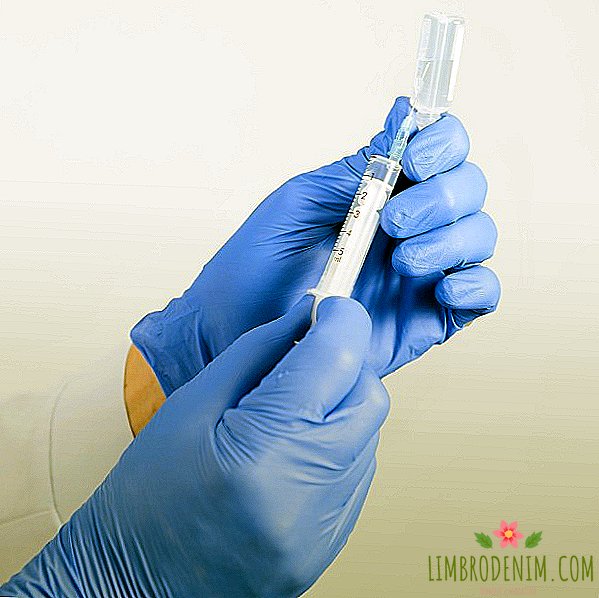To prick or not to prick: Why vaccinations are needed and when to do them
In the world every year there are new drugs and technologies but the general medical illiteracy and the lack of available information lead to the fact that many still trust the “people's means” or advice “from the Internet” much more than the data of scientific studies. Vaccinations are one of these stumbling blocks: surely everyone has friends or parents who carefully protect themselves and children from vaccination. A dense cloud of prejudices, often not based on anything, led to the fact that in Russia and the world actively developed the anti-vaccination movement, which advocated a complete rejection of vaccination.
Dasha Sargsyan, a medical journalist, with the help of infectious diseases specialist Dmitry Troshchansky and a pediatrician, an allergist, immunologist, and head physician at the Children's Clinic "Fantasy" Nikolai Smirnov, explains what you need to know about vaccinations and the arguments of their opponents. You can read more about vaccination in Russian here and here, in English - here.

What vaccines are and why are they needed?
The principle of operation of the vaccine is very simple: a weakened virus / bacterium or their components is introduced into the human body, the immune system naturally reacts, remembers the aggressor and gets rid of it faster and better at the next meeting. Not all vaccines provide 100% protection against infections, but this does not mean that such vaccines are not needed: even if a disease occurs, a person will suffer it more easily. This, for example, applies to BCG, which is often called a vaccine against tuberculosis: a vaccine does not protect against infection, but makes it easier to transfer it if a person is sick.
Vaccination helps not only before contact with the virus or bacterium, but also after. For example, if you are not a veterinarian or a speleologist, then you do not need to be vaccinated against rabies, because the chances of being infected are extremely low. However, if you are bitten by a rabid dog, then it will be necessary to vaccinate, if you do not want to die in agony. Also, after contact, you can protect against hepatitis A (within two weeks, but the sooner, the better, of course; ideally, in the first two days), hepatitis B (very preferably within 24 hours, but allowed up to 7 days), chickenpox (within 72 hours), measles (within 72 hours) and tetanus. These recommendations may differ slightly depending on the patient's age, his vaccination history, and whether it is known that he was in contact with relevant viruses or bacteria.
Over time, the vaccine becomes more and more. And since many vaccinations, some of them are introduced together. For example, there is a combination DPT vaccine (whooping cough, diphtheria, tetanus), PDA (measles / parotitis / rubella) and others. You should not be afraid of a “triple blow”: such vaccinations cause side effects no more often than monocomponent vaccines.
The main diseases for which there are no vaccines yet (but they are being worked on) are HIV infection, hepatitis C, cytomegalovirus infection and malaria. But is there any vaccination, which, on the contrary, refuse? The only vaccine that has disappeared from all calendars is the smallpox vaccine. Since 1979, there is no official disease in the world due to the fact that volunteers have vaccinated people even in the most distant villages of the third world countries. Also recently, the World Health Organization changed the trivalent oral live polio vaccine to bivalent (the type 2 polio virus was removed from it). In countries where tuberculosis is rare, refuse to universal use of BCG.
When to avoid vaccinations
The reasons for the withdrawal of vaccination, absolute contraindications are very few. This is, for example, a severe allergic reaction to a previous vaccination. Pediatrician, allergist-immunologist, Nikolai Smirnov, head physician of the Fantasy Children's Clinic, explains that even those patients who are weakened or suffer from chronic diseases are being vaccinated so that the child has protection. Of course, this should be done when there is no exacerbation or when the disease is under control.
Colic, umbilical hernia, runny nose, mild rash and other similar conditions - false taps from vaccinations without any scientific basis. According to Smirnov, most of the taps are set because of age-old stereotypes or because doctors follow the guidance of their parents. Perhaps the fact is that doctors cannot or are too lazy to explain their position. Studies before vaccination (blood, urine tests) to determine contraindications in civilized countries are not done. All conditions that are not allowed to vaccinate, give symptoms that are easily detected during conversation and examination. When creating vaccines, the fact is taken into account that they will vaccinate, including in places remote from medical care, and not necessarily with the participation of a doctor. Therefore, contraindications for vaccination should be obvious.
Interestingly, some diseases are not included in the contraindications because vaccination in this condition can lead to serious consequences or not work. The fact is that the increase in temperature after vaccination will complicate the choice of treatment tactics: it will be unclear whether the fever has arisen due to illness or vaccination. Pregnancy is not a disease, but also a contraindication for some vaccinations: from chicken pox, measles / rubella / mumps, live flu vaccine.
There are no diseases for which a prolonged vaccination schedule is indicated. When the intervals between vaccinations increase, explains Nikolay Smirnov, a child from an early age decreases the production of effective immunity, not to mention the fact that children are at risk of falling ill. In addition, they begin to memorize injections, they have a negative experience. Therefore, doctors are advised to vaccinate children in time, so as not to provoke bad emotions.

Where did the anti-vaccination movement come from and what does it lead to
The anti-vaccination movement was born with the spread of vaccination - at the beginning of the 19th century - as a manifestation of the fear of new incomprehensible interventions in the body. In the future, the movement was not particularly popular. To understand why, ask elderly relatives about their childhood. Their peers fell ill with polio, measles, diphtheria, they were afraid to go to school, vaccines seemed a salvation. Now, thanks to vaccination, sickness has become much less common, and it’s already not obvious to young people why vaccinations are needed. For example, in the 1990s, there was an outbreak of diphtheria in Russia: people began to inculcate less often - as a result, collective immunity was undermined when the disease did not spread due to the vaccinated majority. When vaccinated people are less than a certain level (each disease has its own boundary), then an outbreak occurs. This is especially dangerous for people with weakened immunity, children who have not yet been vaccinated, and the elderly.
The anti-vaccination movement in Russia has become the most active since the late 1980s. Then a publication appeared in Komsomolskaya Pravda, where the author gave the floor to Galina Chervonskaya (a popular opponent of vaccination) and did not verify the information on which she insisted. Leaders of the anti-vaccination movement often do not have a medical education, but they are a great success. There are many reasons for this, and not one of them is connected with science, mainly with emotions. If you start to check the facts, it turns out that in speeches, articles and books of opponents of vaccination a lot of fraud and anti-scientific statements - for example, that BCG is done only in Russia (this is not so).
The main argument of supporters of the anti-vaccination movement: vaccination "destroys the immune system." But, firstly, science does not know the possible mechanism of “undermining immunity” with the help of vaccines, and secondly, such a process must be accompanied by serious, difficult to treat diseases and permanent hospitalization. However, the increase in the number of these immunodeficiencies in society is not observed. Most of these statements by opponents of vaccination are divided into scientific data and have been repeatedly refuted by supporters of evidence-based medicine - here, for example, you can read a brief summary of such analyzes.
However, any parent who is told that “vaccinations are the death of the immune system” will inevitably consider whether to endanger his child. In this case, the same fear for the health of the child will take its own, if it steps on a nail or goes to the hospital with a complication of measles or mumps. Then usually the child begins to vaccinate from everything that is possible. People most often do not spread about such stories, especially if there have been a lot of anti-vaccination articles in the social networks, but there are exceptions.
Abroad, the beginning of the mass abandonment of vaccination occurred at the end of the 1990s, when an article about the alleged connection between autism and vaccinations was published and later refuted in a scientific journal. It turned out that the author had a commercial interest in publishing an article with such conclusions, moreover, ethical rules were not observed: the authors carried out procedures that were not shown to sick children, such as colonoscopy. Also, 12 children took part in the study, which by modern standards is not enough for any conclusions. It should also be noted that the symptoms of autism spectrum disorders occur at the age when the greatest number of vaccinations are given. Intuitively, these phenomena can be linked, but after large-scale studies it turned out that the rule “after does not mean as a result” is true. Periodically, the spread of anti-vaccination sentiment leads to outbreaks of diseases that we have already begun to think about as disappearing. As a result, not only children whose parents have refused vaccination are killed, but also those who have not been vaccinated for medical reasons or by age.
From what and at what age to vaccinate a child
In each country, the vaccination schedule is compiled depending on the financial capacity of the state and the risk of meeting with pathogens of preventable diseases. In Russia, all vaccinations included in the National Calendar can be obtained free of charge. However, compared with other countries, our calendar is truncated. Fortunately, vaccines that cannot be vaccinated at the expense of the state are mostly registered, that is, they can be used at your own expense.
In contrast to the mandatory calendars of many Western countries, ours do not have vaccinations against meningococcal infection, hepatitis A, chicken pox, human papillomavirus and rotavirus infection. The latter, according to Nikolai Smirnov, is extremely important for children in the first months of life. Frequent liquid stools, vomiting lead to very rapid dehydration and high mortality in children of the first year of life. If you want to protect your child to the maximum, then you can focus on the American or European calendars (although there is usually no BCG) and get ready for spending.
Components of vaccines are only a small part of those viruses and bacteria that children face, even just being at home. That is, there is no talk of overloading the immune system when vaccinating. But why then you can not do all the vaccinations at once? Dr. Smirnov explains that varicella vaccination is done from 12 months, because before this a stable immune response is not formed in children. From pertussis, diphtheria and tetanus is done in the first year of life (the first three doses: at 2, 3, 4 months), so that by the age when the child goes, he is protected. In this case, whooping cough most difficult in the first year of life. However, if vaccinated against these diseases immediately after birth, there will not be sufficient immune protection. Hepatitis B is made on the first day of life, because for young children, hepatitis is more dangerous and it is not known what kind of environment awaits the child at home.
But if a teenager comes to the pediatrician who, not having contraindications, has not been vaccinated and is now going, then you can do a lot of vaccinations at once. Usually in the Western calendars, it is separately stated, for which diseases it still makes sense to vaccinate. Vaccinations can be given at once in several places available for intramuscular or subcutaneous administration, says Dr. Smirnov. For example, whooping cough / diphtheria / tetanus / polio and hepatitis B - in two hands, and measles / rubella / parotitis subcutaneously in any place available for subcutaneous administration. In the future, it is important to observe the intervals between subsequent vaccinations.
In many Western countries, live polio vaccines (they are buried in the mouth) were abandoned and they began to use inactivated (killed) vaccines, which are injected. When using live polio vaccine, there is a minimal risk of the development of so-called vaccine-associated polio. But at the same time, says Nikolay Smirnov, it is believed that it creates a more durable, more reliable immunity. And now the general approach is this: in the civilized world, only inactivated vaccine should be used. In countries where the risks of polio are higher, the live vaccine is also used, and from the first months of life. Compromise: one of the revaccinations to hold a live polio vaccine. Then there is already immunity, and the risks of getting sick with vaccine-associated polio are completely absent.
If you follow the calendar, by the age of 14 the main vaccinations will end. Until the age of 18, only the annual flu vaccine will be needed. And, of course, vaccination, if you live in the territory (or you are going to go there), where tick-borne encephalitis is common, tularemia, and so on. When visiting certain countries (especially Africa and Asia), additional vaccination is also needed.

What vaccinations do adults need?
Adults need to be vaccinated not only from exotic diseases when traveling to Angola, Brazil or another country with an unsafe epidemiological situation. Unfortunately, the effect of many vaccinations made in childhood has faded away. Therefore, you need to defend a new one. The Russian calendar for adults is even more meager than for children, therefore, most likely, the bulk of vaccinations will need to be done for your money. What is necessary to instill in adults? In an amicable way, these are diphtheria / tetanus (every 10 years), the flu (every year), chickenpox (if not sick), human papillomavirus (under 26 years for women and up to 21 years for men), and measles / rubella / parotitis. Ideally, you still need to be vaccinated against whooping cough, but in Russia such a vaccine for adults is not registered.
Smokers and people with bronchopulmonary diseases (for example, asthma) need to be vaccinated against pneumococcal infection. The list may be different if you are not admitted from something in childhood (it is better for the doctor at the first appointment to show all your medical records), if you have some chronic diseases, if you are a homosexual man, if your profession involves certain risks, and so on.
Women who are planning a pregnancy must be vaccinated against rubella (if a blood test shows that there is no protection) and from chickenpox (if you have not been ill before). But after that you need to be protected for at least a month. Such diseases cause gross malformations of the fetus, so it is important to be protected. Influenza is more likely to be severe in a pregnant woman, so you also need to get vaccinated (only inactivated vaccine). In the third trimester, in an amicable way, it is necessary to be vaccinated against whooping cough in order to transfer the antibodies to the child and thereby protect it from the disease for the first time.
People over 60 have additional risks and, accordingly, an additional set of vaccinations. Up to 64 years, it is better to take root from shingles (unfortunately, such a vaccine is not registered in Russia), from 65 years old - from pneumococcus.
Does the flu vaccine work?
Now vaccination is the most reliable way to protect against the flu. But I must say, this vaccine does not work as well as we all would like. As you know, the influenza virus mutates, and each year you need to create a new vaccine. The definition of strains that will form the basis of vaccination, is engaged in the World Health Organization. Quite rarely there are failures, and WHO chooses not the strains that are common. Accordingly, the protection of vaccinated people in such years falls. But on average, the vaccine prevents the disease in 3 out of 5 people. It should also be said that those vaccinated people who do get sick usually suffer flu more easily.
Flu vaccine is especially recommended for children older than 6 months, the elderly and pregnant, because they are at increased risk for complications. For others, the benefits are not so obvious: they usually get sick less often and more easily. But if you want to protect yourself, then the US Centers for Disease Control and Prevention recommends doing so.
Do Russian vaccines yield to imported
It is believed that foreign counterparts are safer in terms of side effects - and Nikolay Smirnov agrees. According to him, they are more standardized, more purified - in other words, better quality. However, if there is no alternative, it is better to use domestic vaccines. К примеру, у АКДС, защищающей от дифтерии, столбняка и коклюша, есть плюс: она формирует довольно мощный и прочный иммунный ответ.
С российскими вакцинами от гриппа история несколько другая: в наиболее популярных из них в три раза меньше антигенов чем рекомендует ВОЗ. But they have immunostimulants (for example, polyoxidonium), which, according to the manufacturers, should boost the immune response, that is, the response to a smaller dose of antigens should be sufficient for protection. According to infectiologist Dmitriy Troshchansky, the data on the clinical trials of these drugs are classified. That is, in fact, we know nothing about the effectiveness of these vaccines.
If you don’t want to be vaccinated with a domestic vaccine, but you don’t want foreign vaccine, you can go abroad - flu vaccines are already available there in August. It is better to take root abroad, because it is difficult to carry the vaccine to Russia: it requires strict adherence to the temperature regime and must be surrounded by cold elements. If stored improperly, says Smirnov, some vaccines lose their effectiveness, less often - the risk of side effects increases. So, if you are going on vacation abroad, you can already prepare for a seasonal flu outbreak there.
Photo: sveta- stock.adobe.com, Damian Gretka - stock.adobe.com, koosen - stock.adobe.com, osoznaniejizni - stock.adobe.com





